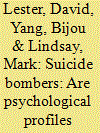|
|
|
Sort Order |
|
|
|
Items / Page
|
|
|
|
|
|
|
| Srl | Item |
| 1 |
ID:
091807


|
|
|
|
|
| Publication |
2009.
|
| Summary/Abstract |
The emergence of Jundullah and its activities in Iranian Balochistan has triggered a hostile reponse from Iran's leadership towards the Pakistan government for supporting and assisting the militant organisation.
|
|
|
|
|
|
|
|
|
|
|
|
|
|
|
|
| 2 |
ID:
138801


|
|
|
|
|
| Summary/Abstract |
International terrorism has a history of targeting airliners and airports. The deadliest-ever single act of terror against civil aviation was the 1985 bombing by Sikh terrorists of Air India flight 182 from Toronto over the Irish coast, with a loss of 329 passengers and 22 crew members. Since the 1990s, civil aviation has emerged as a principal target for various militant Islamist groups. Certain foreign governments, among them the Islamic Republic of Iran, are known to deploy client terrorist groups, like Hizbullah, for terrorist operations against countries toward which they are hostile. State-sponsored terrorism was responsible for the 1988 bombing of Pan Am flight 103 over Lockerbie, Scotland, with the loss of 259 lives, for which a Libyan intelligence officer was subsequently convicted but subsequently released before completing his jail term.
|
|
|
|
|
|
|
|
|
|
|
|
|
|
|
|
| 3 |
ID:
132214


|
|
|
|
|
| Publication |
2014.
|
| Summary/Abstract |
Militant organizations pursue two common aims: to survive and to achieve the goals that define their raison d'être. Yet, elements that sustain the life spans of militant organizations are not necessarily the same components that advance the accomplishment of their core, or "outcome," goals. Further, some organizational practices, such as the use of suicide attacks, generate a tradeoff that bolsters survivability while detracting from the effective pursuit of outcome goals. This study demonstrates that three operating conditions explain variation in the duration and achievement of contemporary militant organizations: receptiveness to tradeoffs, levels of external support, and the nature of adversaries. As such, the unique effects of different operating conditions reveal why many militant organizations survive for long periods of time but only a few achieve the goals that justify their existence.
|
|
|
|
|
|
|
|
|
|
|
|
|
|
|
|
| 4 |
ID:
109674


|
|
|
| 5 |
ID:
134006


|
|
|
|
|
| Publication |
2014.
|
| Summary/Abstract |
What explains the adoption of military innovations? In this article, we assess the empirical validity of adoption capacity theory by reconsidering one methodologically important case analyzed by Michael Horowitz: the diffusion of suicide terrorism. We show that, when addressing problems in Horowitz's research design, the case of suicide terrorism fails to support adoption capacity theory. We argue that, in order to account for the diffusion of this innovation, one needs to take into consideration the tactical incentives to overcome technologically superior enemies. The results of our quantitative and qualitative analyses suggest that terrorist groups fighting against very powerful states in terms of conventional capabilities are more likely to employ suicide attacks than those fighting against poorly equipped ones. Our findings are important because they provide systematic evidence in support of Kalyvas and Sànchez-Cuenca's argument that suicide terrorism is driven by tactical considerations and because they provide confidence in the external validity of Berman and Laitin's hardness of targets hypothesis. Our results also question Lyall and Wilson's finding that highly mechanized armies are inherently inadequate to win counterinsurgency operations. The superior conventional capabilities of a counterinsurgency army might in fact make traditional insurgent tactics ineffective and thus give insurgents an incentive to adopt suicide attacks.
|
|
|
|
|
|
|
|
|
|
|
|
|
|
|
|
| 6 |
ID:
069047


|
|
|
| 7 |
ID:
052394


|
|
|
|
|
| Publication |
Jul-Aug 2004.
|
| Summary/Abstract |
Research on the characteristics of suicide bombers is reviewed. Contrary to previous commentary, it is suggested that suicide bombers may share personality traits (such as the "authoritarian personality") that psychological profiles of suicide bombers might be feasible, and that the suicide bombers may be characterized by the risk factors that increase the probability of suicide.
|
|
|
|
|
|
|
|
|
|
|
|
|
|
|
|
| 8 |
ID:
052393


|
|
|
|
|
| Publication |
Jul-Aug 2004.
|
| Summary/Abstract |
This article examines the strategic utility of suicide terrorism. Suicide terrorism, we suggest, can be thought of as a form of strategic "signaling." We define terrorism as a signaling game in which terrorist attacks are used to communicate a group's character and objectives to a set of target audiences. This is followed by an examination of the utility of suicide attacks as a signaling tactic. The relative effectiveness of suicide operations is evaluated in relation to other tactical options that are traditionally available to terrorist organizations. We go on to examine the institutional and social context of suicide terrorism, concluding with an examination of the evolutionary use of suicide attacks by Palestinian terrorist organizations and the Liberation Tigers of Tamil Eelam.
|
|
|
|
|
|
|
|
|
|
|
|
|
|
|
|
| 9 |
ID:
076608


|
|
|
| 10 |
ID:
077540


|
|
|
|
|
| Publication |
2007.
|
| Summary/Abstract |
This article traces the pathologization of suspected terrorists held captive at the U.S. military base in Guantánamo Bay, Cuba. The occurrence of several reported suicide attempts among the detainees provided "proof" for their captors that terrorists are indeed fanatical madmen. These same reports of suicide attempts, however, were contradictorily diagnosed by human rights and humanitarian organizations as evidence of psychological deterioration induced by prolonged detention. What is notable in this diagnostic competition over what, exactly, afflicts the detainees is that both advocates and resisters to the detentions pathologized the detainees by chalking up the suicide attempts to their purportedly impaired psyches. This is significant because the pathologization of the detainees is one condition of possibility for their excision from the global body politic. Authoritarian practices, such as the incarceration of the "mad" and the detention of "suspected terrorists," are theorized as integral to global liberal governance, which divides up populations, and subjects those deemed mad, deviant, or dangerous to coercive measures in the name of order, security, and liberty. The article concludes with a consideration of the ways in which international relations (IR) could be more attentive to the operation of the "psy" disciplines in the conduct of international affairs
|
|
|
|
|
|
|
|
|
|
|
|
|
|
|
|
|
|
|
|
|